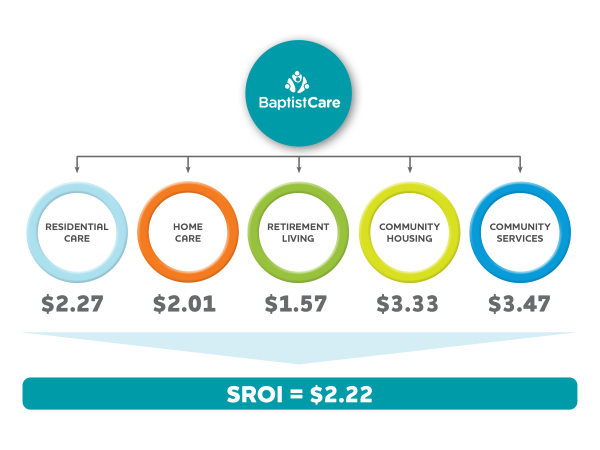Measuring Our Social Impact
Why valuing how we provide social, community and well-being benefits is more important than ever.
Scroll to Explore

28 April 2023
Widespread economic challenges and rising environmental and social pressures mean it is now more important than ever to measure and manage social impact. Here’s how BaptistCare is taking an innovative approach to understand and analyse the benefits we deliver to vulnerable people and communities.
Facing an ageing population, the housing and cost of living crises, workforce shortages and surging pressure on community and social services, organisations of all sizes need to define and demonstrate the benefits they create – for their staff, clients and the broader community they serve.
As a profit-for-purpose organisation, BaptistCare is taking a new approach to demonstrating our social impact and embedding this in decision-making. Our new social return on investment (SROI) framework demonstrates that for every $1 BaptistCare invests in the people we care for, the positive return to individuals and society is more than two-fold, and more than three-fold for community services and social and affordable housing.
Why measure our social impact
With tough competition for resources, staff and funding, there is a growing list of reasons why it is essential to understand, communicate and manage social impact.
When undertaking the project, BaptistCare identified that measuring our social impact would help keep impact at the core of decision-making, while demonstrating the value we deliver to the community, government, partners and other stakeholders through quality care for vulnerable Australians.
It would also help support advocacy on pressing social topics, such as the housing crisis, while showing staff and volunteers the vital contribution they make to BaptistCare’s purpose of ‘transforming lives’.
No ‘one size fits all’
Social impact is an evolving field, and there is a range of approaches available to measure and value this impact. After careful consideration, BaptistCare identified social return on investment (SROI) as an appropriate method.
“We wanted an approach that could be applied across the business, from aged care and retirement living to home care, community services and social and affordable housing. We wanted to understand both the financial and the positive social and community value we create,” says Thomas Griffiths, Head of Strategy & Acquisitions.
What is ‘Social Return on Investment?’
SROI is an emerging form of impact analysis that seeks to quantify benefits typically excluded from traditional cost-benefit analysis. It is particularly useful for not-for-profit or mission-based organisations that seek to foster positive social change but have benefits that are difficult to measure in traditional financial terms.
We partnered with ACIL Allen to develop an impact framework that shows how we positively impact our clients and communities. Our five impact areas are:
- Service Cost Savings, such as avoided hospitalisations
- Economic Empowerment & Independence, capturing both the employment opportunities generated from BaptistCare’s services and the employment BaptistCare directly provides
- Family Support & Relationships, relating to improvements in family relationships
- Health & Safety Outcomes, namely improved health and safety outcomes for clients
- Connected Communities, the improvements in community connectivity and an individual’s ability to feel socially connected, which contributes to mental health and well-being.
The ACIL Allen report shows the positive impact of our work on clients. In 2021-22, ACIL Allen estimates BaptistCare generated:
- $2.22 for every dollar invested in service delivery;
- An average net social impact (benefits minus costs) of $23,700 per client; and
- A total social impact of $733 million from an investment of $331 million.

Impact-led growth & ongoing improvement
BaptistCare is growing and has over $1 billion of construction planned for the next five years.
“We want to ensure this growth is impact-driven,” Thomas explains.
“In most of the communities we serve, the need outstrips supply, be that the rental crisis, residential homes closing or aged care workforce shortages.”
“So, it’s vital we demonstrate how our investments and services enhance the social benefits and well-being of the people and communities we serve,” he says.
The SROI framework is an example of BaptistCare’s ongoing commitment to social and environmental sustainability and caring for people, planet and the community.